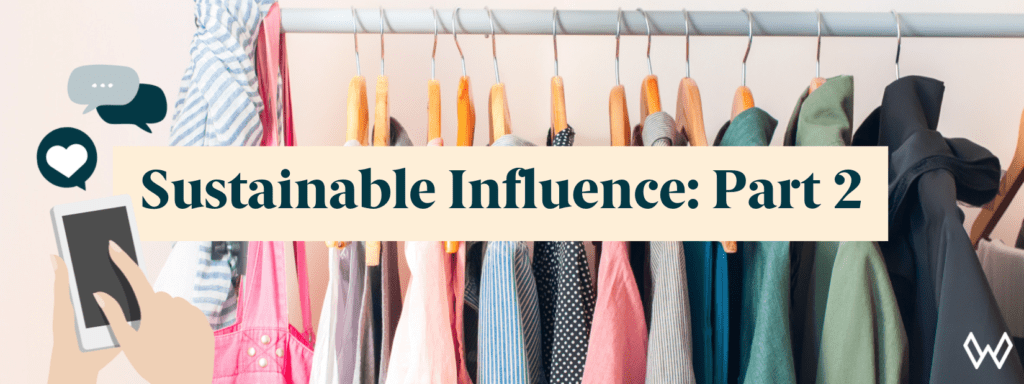
7 Tips to create an Ethical Influencer Marketing Strategy (that protects your brand reputation)
As brands continue to invest more in influencer marketing, they need to think carefully about whether their approach fulfils the ethical and equality-driven expectations that are rightly being placed on industry. Failing to create an ethical strategy can harm your brand reputation, cause you to lose revenue and prevent you from building a strong community of advocates. The ethics and core values of a brand are now more important than ever when it comes to maintaining brand loyalty and prioritising an ethical influencer marketing strategy is non-negotiable.
At Wearisma, we encourage our clients to place ethics at the forefront of their agenda by sparking conversations around the best ways for them to curate an ethical influencer marketing campaign suitable for their brand DNA. Relevance and trust are now dependent on a brand showcasing originality, equality, and ethical practises both on a corporate level and through their online communications; here are our top tips for ensuring your influencer marketing strategy is successful in more ways than just profit:
7 tips to create an ethical influencer marketing strategy
1. Analyse your chosen influencers’ historical content
It’s important you take the time to get to know your influencer’s content before jumping to partner with them. Reviewing past content allows you to make an informed decision on whether your chosen influencer is the right match for your brand for the following reasons:
- Analysing historical content enables you to see if your chosen influencer has previously partnered with any of your competitors, as well as getting the inside scoop on how well their content performed
- You can determine If they have previously posted any content that doesn’t align with your brand values or core beliefs, as well as simply checking if their aesthetic aligns with your brand’s DNA
- Analyse how certain topics and trends performed within a specific influencer’s community, allowing you to gauge how effective they will be for your current campaign
Wearisma is one of the only platforms that enables you to see over 5+ years of historical content, allowing your brand to ensure you are doing your due diligence and protecting your brand reputation when it comes to working with influencers.
2. Check that your chosen influencers are declaring #sponsored content
New advertising standards mean that influencers and brands now have to declare sponsored content from brands, so make sure the influencers you are excited to work with adhering to these guidelines.
In fact, audiences demand this level of transparency from influencers and research suggests that declaring sponsored posts doesn’t impact the posts’ performance. In 2020 alone, brands spent $98 billion on social media advertising across the globe, a figure that has grown exponentially at a rate of 20% per year over the past four years. This places it as the highest growth digital marketing category, revealing the relevance and success of sponsored partnerships with influencers remains on the rise. Wearisma’s platform enables you to clearly see an influencer’s sponsored content and compare the performance of sponsored vs. organic content, so you can see the full possibilities of your partnership.
3. Pay influencers fairly by checking their performance metrics
When it comes to figuring out how much value to place on your post, it’s important to make sure you are approaching influencers fairly and with a well-thought-out fee. With platforms such as @influencerpaygap gaining traction, the influencer community has been openly sharing experiences of being low-balled by brands based on discriminatory factors. It is essential for brands to be ethical and place welfare, respect, and equality at the forefront of their approach when working with influencers. Brands must utilise insights such as the amount of traffic, engagements, and other performance metrics such as sales to pay influencers fairly and maintain good working relationships. Our Clicks and Sales tool allows brands to track sales in order to ensure you are generating an impactful and cost-effective influencer marketing campaign, as well as help you maintain good working relationships with your influencers.
4. Ensure that you are partnering with a diverse range of influencers.
Several brands have been called out for failing to be inclusive with their influencer selection, with consumers now demanding brands make a decisive commitment to diversity and inclusion. Research in 2021 shows that significantly more consumers (60%) find diversity and inclusion to be important when engaging with brands. Furthermore, Fashion Psychologist Shakaila Forbes-Bell’s research found that people are interested in and willing to spend more money on brands that use diverse spokespersons in their campaigns. Wearisma’s inclusive discovery solution helps to sift out unconscious biases by harnessing the engagement metrics of diverse influencers around the world who are passionate about advocating for equality.
5. Responsibly collect data
It’s important for brands to be transparent in how they operate. People are now more concerned with how their data is used and shared online, with the upheaval of cookies through recent changes in privacy legislation now requiring websites to ask for permission before retrieving information from personal devices. Even apps are now required to explicitly ask users for consent before tracking data or location services, speaking to the heightened awareness and consideration around the ways in which our personal information is used online. For example, Wearisma’s StoryVault tool requests permission from influencers to share statistics private to them, given the campaign they have agreed to be a part of, so that campaign metrics can be shared much more seamlessly and responsibly. This approach fosters trust and transparency, strengthening the relationship your brand has with its community of influencers.
6. Give credit
Today’s generation of social media users drive our channels as a space of social awareness, accountability, and authenticity. Our social media communities are a powerful force of accountability and will not hesitate to call out brands who steal influencer content or do not pass the mic to those on the platform who are better equipped to advocate for specific social issues.
Social media accounts such as @dietprada are emblematic of the kind of accountability and transparency that is demanded from this generation of social media users. Holding brands up to standards of equality, inclusion, and originality, the community is quick to defend smaller brands, influencers, or artists who have been unfairly treated by major companies. If a brand underpays, copies, or imitates ideas from those with less exposure, our social media communities don’t let it go unnoticed. It goes without saying, but brands must ensure they give credit to anyone who has inspired content or products they are considering putting out.
7. Partner with true brand advocates
Looking beyond the numbers to those who rave about, share, and engage with your brand authentically can help you expand your organic reach and connect with everyday consumers in a way that feels closer to home. Wearisma’s research shows that most people (71%) trust content from other people they know compared to content from brands (36%), revealing the undeniable benefit of generating brand love through everyday consumers.
What is a ‘true brand advocate’
At Wearisma, we wanted to find out what brand love really means so we asked 1000 people to identify the most important features to look for when finding those best suited to advocate for your brand. Our survey sought out answers to the question ‘What qualities do you consider to be possessed by a true brand advocate?’ We received the following responses:
- Someone who already uses the product such as genuine customers who can provide honest reviews highlighting the benefits and drawbacks of the latest products.
- Someone who is passionate about the brand or has expertise in a similar field, and are therefore independently knowledgeable about the brand’s service or product.
- Someone who is selective with who they choose to work with and is therefore more likely to be perceived as genuine.
- Someone who provides full transparency regarding partnerships and those preferring reviewers who have not been paid.
“It’s important to have the right advocates for your brand, which are in line with your brand values and representative of your community. I’d recommend Wearisma to anyone who is not only looking for a way to manage your community online but to also discover which advocates your customers are engaged with whilst having the data and insights from Wearisma to see who works well and who doesn’t.”

Lucy Sellers
Brand Manager, Ann SummersIn a world where our social media channels are often criticised for being saturated with advertisements and superficial content, make sure your brand is tapping into the side of our social media spaces that hold us all together; the one driven by community-building, transparency, and inclusion.
Schedule a demo today if you would like to see how Wearisma’s solutions can help you achieve an ethical influencer marketing strategy, or get in touch at .


